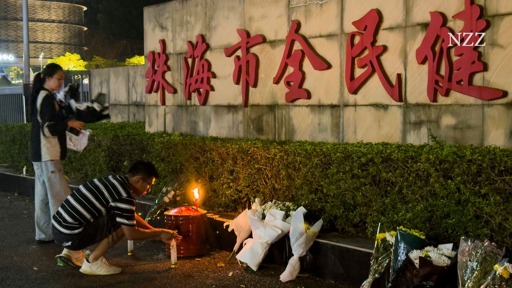- cross-posted to:
- [email protected]
- [email protected]
- cross-posted to:
- [email protected]
- [email protected]
cross-posted from: https://feddit.org/post/5351469
Summary
- Deadly rampages are on the rise in China, including recent vehicle attacks and stabbings.
- These assaults are seen as acts of personal revenge against an unjust society; social exclusion and lack of access to help mechanisms are considered as causes.
- Growing economic hardships and a narrow definition of success contribute to discontent.
This November alone, at least three men carried out deadly attacks in China. A 62-year-old drove his SUV into a crowd, killing 35 people. A 21-year-old vocational student fatally stabbed eight women in his school’s female dormitory. Another driver plowed into a group of schoolchildren, leaving several injured. On Thursday, unverified reports and videos on social media pointed to yet another incident involving a truck, though official confirmation is still pending.
Such violent acts are becoming more frequent and more severe in China. But they are far from unprecedented. They carry a chilling familiarity, akin to how mass shootings are viewed in the United States. Yet, with China’s strict gun laws, attackers often resort to knives, axes or vehicles as their weapons of choice. As is the case in the U.S., schools are a disturbingly common target, and the perpetrators are overwhelmingly male.
[…]
According to a 2019 study by researchers Ma Ziqi and Zhao Yunting from Shanghai, most violent offenders experience some form of societal exclusion before committing their crimes – whether from the job market, the education system or other institutional frameworks. Many lack access to mechanisms that could help them address their grievances, such as legal aid, mediation bodies or public forums. Others are excluded from social benefits, such as unemployment insurance, health care or even the right to enroll their children in urban schools.
[…]
High unemployment rates, an issue identified in the 2019 study, is even more pressing today. Youth unemployment alone is estimated at around 20%. Mediation systems are poorly developed, public discourse is tightly censored, and the legal system often appears arbitrary. Migrant workers – numbering in the millions – face particularly stark challenges as they are treated as second-class citizens in urban areas, excluded from many social benefits.
When the economy is thriving, such systemic flaws often go unnoticed. Economic growth offers the promise of upward mobility, allowing people to improve their living standards through hard work. This implicit «social contract» between the people and the Communist Party – where the Party retains political control in exchange for year-on-year economic betterment – has kept dissent in check.
But the ongoing economic slowdown has left many feeling abandoned. Optimism has given way to a sense of powerlessness. A growing number of Chinese citizens are asking how, after a lifetime of hard work, they find themselves drowning in debt – losing their jobs, their homes and even their families.
[…]



Stability at the cost of liberty is tyranny.
That slogan doesn’t hold true.
Stability, in the real world, requires some limitations on liberty. The mere concept of imprisonment is a HUGE violation of autonomy, freedom and liberty. Even basic foundations of civilisation like “don’t dump industrial waste and personal rubbish wherever you want”, “don’t kill people if you don’t like them” impose on liberty, and further restrictions for the sake of public safety and stability are clearly against liberty - “don’t drive vehicles when impaired by drugs”, “don’t yell FIRE in crowded venues”, “don’t employ workers without taking basic operational health and safety precautions”. None of these governmental dictations are tyranny, unjust or oppressive. They’re limiting liberties for the sake of stability.
And that also extends further. There is a general balance in governance between giving citizens, state forces and corporations the freedoms they need or want, and of keeping society from dissolving. If we let people with lots of money use it on whatever they want, we get environmental havoc, like that fucker who cleared koala habitats for a private runway and industries destroying the Great Barrier Reef. I don’t think restricting their use of their power (money) is tyrannical, but they certainly claim it is.
(As for China, I personally agree they lean too far into restricting some liberties of regular citizens. To a lesser degree, I even think the same thing about Australia too. However, I also believe Australia grossly under-restricts the freedoms of megacorporations and billionaires to destroy our wildlife, climate, living standards and practical rights to resist their dictatorial demands as employees, while the CPC is increasingly punishing the owner class for the sake of citizen empowerment, stability and their environment. This balancing act of the rights of the worker class vs the rights of the owner class vs the rights of the state create interesting differences which goes beyond simple concepts like freedom and tyranny. Politics and governance is complex and abstract ideals like ‘liberty’ as a general idea just can’t adequately explain it)